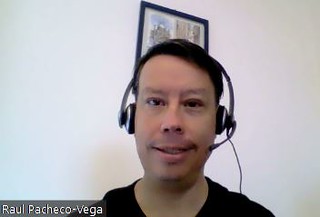I am absolutely exhausted. And it’s only late October 2020.
 I want to preface this blog post by saying that I love teaching, and that I know that part of the reason why I am tired is that I am honoring all the commitments to my previous institution (CIDE) and my current one (FLACSO Mexico) so I am teaching more courses than I am used to. I am definitely not a stranger to online teaching, did it over the summer with wild success and I have enough technological literacy.
I want to preface this blog post by saying that I love teaching, and that I know that part of the reason why I am tired is that I am honoring all the commitments to my previous institution (CIDE) and my current one (FLACSO Mexico) so I am teaching more courses than I am used to. I am definitely not a stranger to online teaching, did it over the summer with wild success and I have enough technological literacy.
I also have a passion and interest in pedagogy so I have taken courses over the summer, experimented with sample classes, etc.
BUT I SERIOUSLY BELIEVE THAT THIS IS NOT A SUSTAINABLE MODEL.
My good friend, Dr. Juliette Levy, sums it up:
I worry about my colleagues who are teaching live zoom lectures multiple times a week & I worry even more about students who have to be on endless zoom classes. Its untenable. We have to talk about active pedagogy & asynchronous instruction or we will all burn out by Thxgiving
juliette levy (@profjuliette) October 25, 2020
I have been an educator since I was eleven years old. I love teaching, mentoring, tutoring, educating. But doing this online thing via synchronic (and I would say even asynchronic) delivery is not sustainable, at least in the way we seem to be doing it right now.
I do miss being physically in the classroom, surrounded by brilliant students.
I draw energy from my students. I also can walk throughout the room. I can also scribble on the whiteboard.
A lot of proponents of asynchronous delivery suggest recording short segments so students can watch them on their own time. I have seen great lectures that are recorded in a way that puts much less stress on the speaker by using a camera and recording the lecturer as they walk students through whiteboarded ideas.
But the kind of applied, hands-on stuff I teach is not really very easy to deliver in the YouTube lecture kind of model. I also wonder about spending so much time physically sitting in front of a computer – to take classes, to do homework, to email, to coordinate with friends and colleagues for group work. This is very concerning.
I know that online teaching works. It’s been working for ages. The problem is that we have multiple compounding factors making online teaching harder. Students are worried about funding, worried about their parents’ and loved ones’ health (hoping they won’t catch COVID19), frantic about their own health. Can they really take online classes and just focus on that? No, I don’t think so. Because if they are parents, they don’t have daycare (because they’re closed in most countries).
Perhaps we need to just keep the sound for some classes, or record short segments (VERY short) with quick online meetings with students. I don’t know, but this is getting very tiring. I wrote a Twitter thread reflecting on this that might be of interest to my readers:
We need to reconsider our online teaching model.
I am seriously exhausted. It’s not Zoom (it could be Webex, or Microsoft Teams, or BlueJeans).
It’s the fact that I am sitting down and staring at a computer for HOURS.
That’s why I now have a new model for 3 hour classes.
Dr Raul Pacheco-Vega (@raulpacheco) October 24, 2020
Here, I explain my new model for 3 hour classes:
… my students submit work on time.
I gave a presentation today and then I attended a thesis defense and doing two blocks of online work entirely knocked me out.
This is not sustainable, all y’all.
We can’t do Zoom University the same way we do in-person teaching.
Dr Raul Pacheco-Vega (@raulpacheco) October 24, 2020
And I added one last bit: perhaps just listening into some classes would be better? Others won’t work, of course, but maybe this is a thought.
I want to add one important insight my good friend @profjuliette gave me:
What is important (in most cases, obviously) is the voice. So a good microphone is more relevant than a good camera.
Dr Raul Pacheco-Vega (@raulpacheco) October 24, 2020
At any rate, I really hope we can control the COVID19 pandemic because this is getting really out of hand.

0 Responses
Stay in touch with the conversation, subscribe to the RSS feed for comments on this post.